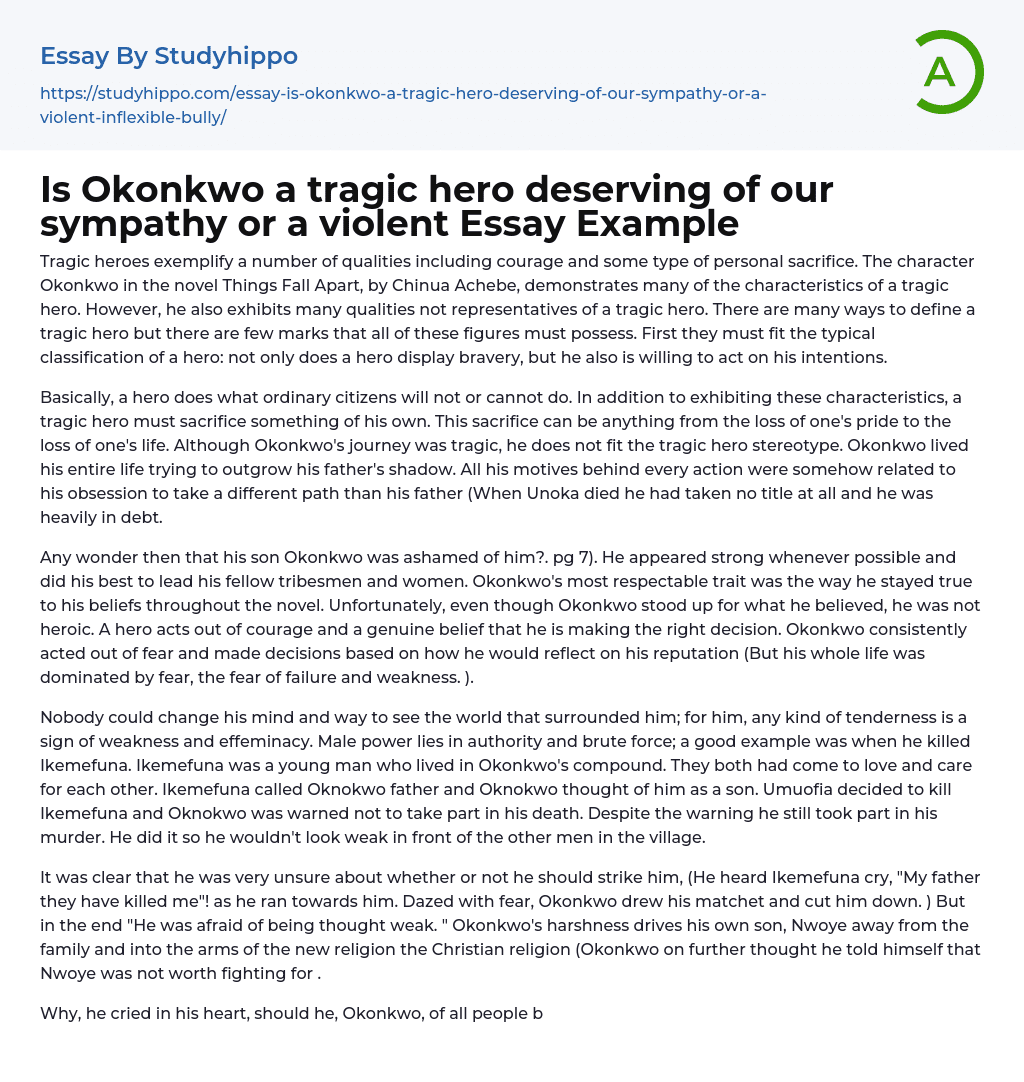

Is Okonkwo a tragic hero deserving of our sympathy or a violent Essay Example
Tragic heroes exemplify a number of qualities including courage and some type of personal sacrifice. The character Okonkwo in the novel Things Fall Apart, by Chinua Achebe, demonstrates many of the characteristics of a tragic hero. However, he also exhibits many qualities not representatives of a tragic hero. There are many ways to define a tragic hero but there are few marks that all of these figures must possess. First they must fit the typical classification of a hero: not only does a hero display bravery, but he also is willing to act on his intentions.
Basically, a hero does what ordinary citizens will not or cannot do. In addition to exhibiting these characteristics, a tragic hero must sacrifice something of his own. This sacrifice can be anything from the loss of one's pride to
...the loss of one's life. Although Okonkwo's journey was tragic, he does not fit the tragic hero stereotype. Okonkwo lived his entire life trying to outgrow his father's shadow. All his motives behind every action were somehow related to his obsession to take a different path than his father (When Unoka died he had taken no title at all and he was heavily in debt.
Any wonder then that his son Okonkwo was ashamed of him?. pg 7). He appeared strong whenever possible and did his best to lead his fellow tribesmen and women. Okonkwo's most respectable trait was the way he stayed true to his beliefs throughout the novel. Unfortunately, even though Okonkwo stood up for what he believed, he was not heroic. A hero acts out of courage and a genuine belief that he is making the right decision. Okonkwo
consistently acted out of fear and made decisions based on how he would reflect on his reputation (But his whole life was dominated by fear, the fear of failure and weakness. ).
Nobody could change his mind and way to see the world that surrounded him; for him, any kind of tenderness is a sign of weakness and effeminacy. Male power lies in authority and brute force; a good example was when he killed Ikemefuna. Ikemefuna was a young man who lived in Okonkwo's compound. They both had come to love and care for each other. Ikemefuna called Oknokwo father and Oknokwo thought of him as a son. Umuofia decided to kill Ikemefuna and Oknokwo was warned not to take part in his death. Despite the warning he still took part in his murder. He did it so he wouldn't look weak in front of the other men in the village.
It was clear that he was very unsure about whether or not he should strike him, (He heard Ikemefuna cry, "My father they have killed me"! as he ran towards him. Dazed with fear, Okonkwo drew his matchet and cut him down. ) But in the end "He was afraid of being thought weak. " Okonkwo's harshness drives his own son, Nwoye away from the family and into the arms of the new religion the Christian religion (Okonkwo on further thought he told himself that Nwoye was not worth fighting for .
Why, he cried in his heart, should he, Okonkwo, of all people be cursed with such a son? . Perhaps Okonkwo's worst mistake because of his proudness was that of the Christians. During Okonkwo's absence
the Christians built a growing church and a government rising in power in his village Umuofia. Okonkwo hated the new religion and wanted to destroy it. So he decided to take matters into his own hands. During a village meeting in the middle of the marketplace and in front of most villagers he killed the head messenger of the new religion. Okonkwo knew the District Commissioner was going to murder him for killing his messenger, so he hung himself.
Okonkwo hung himself because he was unable to maintain a particular faith, and he takes the easiest way out, the way of the coward. Okonkwo killed himself because he refused to change, he gave up before he had done any good and therefore failed in his quest to save the clan (He wiped his matchet on the sand and went away). In my opinion Okonkwo brought himself to his own destruction. Everybody makes mistakes; it's just that some mistakes could lead us to a fatal end, like the ones that Okonkwo made. He was too proud to respect anybody or anything that didn't coincide with his believes; this ultimately destroyed him.
- Leader essays
- Biography essays
- Power essays
- Superhero essays
- Mission essays
- Purpose essays
- Helping Others essays
- Actions essays
- Ambition essays
- Anger essays
- Betrayal essays
- Boredom essays
- Confidence essays
- Courage essays
- Desire essays
- Disgrace essays
- Doubt essays
- Empathy essays
- Fairness essays
- Fear essays
- Feeling essays
- Forgiveness essays
- Grief essays
- Guilt essays
- Happiness essays
- Harmony essays
- Hate essays
- Honesty essays
- Honor essays
- Hope essays
- Humanity essays
- Inspiration essays
- Kindness essays
- Laughter essays
- Loneliness essays
- Lost essays
- Loyalty essays
- Need essays
- Passion essays
- Pressure essays
- Pride essays
- Regret essays
- Respect essays
- Responsibility essays
- Sarcasm essays
- Shame essays
- Suffering essays
- Suspense essays
- Tolerance essays
- Adaptation essays



